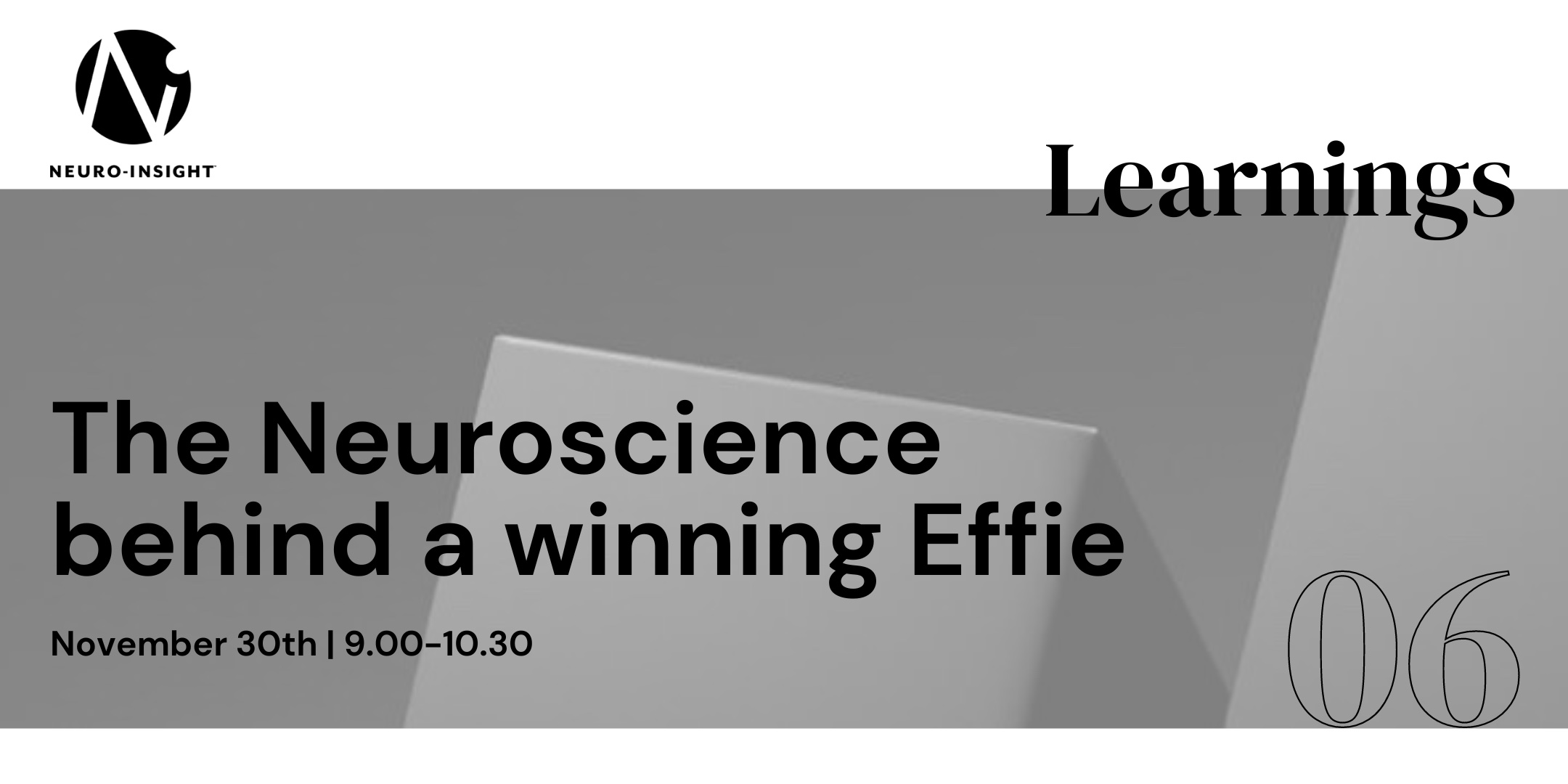Neuro-Insight and Commercial Comms Council uncover the neuroscience behind a winning Effie

In conjunction with the NZ Comms Council and the Effie’s Steering Committee, Neuro-Insight recently placed a collection of Effie winning TV ads from previous years through neuroscience fieldwork to explore common themes which contributed to the success of these campaigns.
Following last weeks’ announcement of this year’s Effie winners, it’s a good time to reflect upon the key findings of this study which was conducted earlier this year.
Memory and emotion drive our behaviour
The research and science communities have long agreed that for advertising to be effective, it must make its way into memory. Our memory exists to be a guiding light for our future decision-making and behaviour.
Neuroscience has taken this a step further and proven that creative which can stimulate a combination of long-term memory encoding and emotion, is more likely to drive positive commercial outcomes.
All of the Effie’s winners which we placed through neuroscience fieldwork were successful in driving a combination of high levels of memory and emotion. This combination is effective because powerful emotions garner more energy and focus from our brains which is then more likely to commit the experience to memory.
Our brain loves a good story
Hopefully, it doesn’t come as a shock to any marketers, that our brains are not particularly interested in your brand. However, the opportunity for brands, is that the brain likes nothing more than to follow a great story.
Each of the Effie’s winners we analysed had driven emotion and memory through captivating storytelling, at the heart of which was a deeply human insight. These insights are most powerful when they leverage a contextual factor which are important to consumers, such as health, social, economic, political, or cultural.
The insight is personal
The insights and stories which were leveraged by the Effie’s winners came in many varied forms. But what was consistent was that a deeply personal human insight was at the heart of the storytelling. This included Bay Audiology tapping into the impact that hearing difficulties can have on loved ones, whilst the creative for the Electoral Commission successfully contrasts how it feels to not be seen or heard versus feeling like we are a part of our community when we make the effort to vote.
With their “Unbreakable bond” Grand Effie winning campaign, the Toyota Hilux creative strategy sought to be a celebration of all thing’s kiwi, all ages, genders, and lifestyles. This unapologetic festival of diverse kiwi characters, with banter at the core, successfully captured audiences under its spell.
The Grand Effie winner in 2021, Speights “the dance” campaign, which blends its traditional theme of masculinity with a more emotive and romantic tale about a couple’s wedding dance, is still effective in engaging and drawing us in emotionally, several years after we were first introduced to this storyline.
Neuro-Insight GM, Brian Hill, commented that “the results confirm what we experience in our work with our clients. That good creative will engage viewers, capture attention, retrigger and consolidate memory, and can continue to do so long after its initial launch.”
Keeping it subtle
Another consistent theme was that the sales message was woven into the story-telling narrative, so the audience didn’t feel overtly sold to. There is much research, including that by Robert Heath in the UK, which suggests that brand relationships can sometimes be increased when consumers are paying low levels of attention to advertising. This is because the more attention we give something, the more our brains can counter-argue what we see and hear, and therefore it can have less impact on our future behaviour.
This research was supported by the 2022 Effie Steering Committee. Committee member David McIndoe had to say “Subjectivity is a great strength in the development of powerful creative solutions, but it is a distinct weakness when it comes to measuring effectiveness. Internal opinions and anecdotal feedback mixed with audience self-reporting is fraught with filters and bias. This approach is invaluable as it provides an independent, unfiltered, and unspun view on the baseline human response to our work”.
To learn more about the neuroscience behind an award winning advert sign up for the Comms Council Learning Webinar here.
The 2022 Aotearoa Effie Awards were proudly presented by the Commercial Communications Council (Comms Council) in association with TVNZ, its Commercial Partner. Comms Council also thanks Commercial Partner oOh!media and sponsors: Nielsen, NZME, The Radio Bureau, Meta, Google, Cartology, Neuro-Insight, NZ Story, and Stuff.
